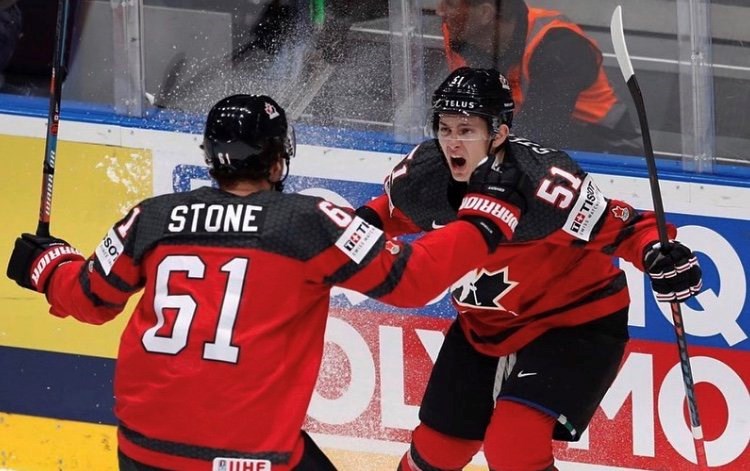Finland’s starting goaltender played part of the season in the ECHL. Their leading scorer is 5’7” and their top goalscorer is 18 years old. They had just two players that spent any time in the NHL last season and each of them played half their season in the AHL. Neither one has ever scored an NHL goal.
This Finnish team wasn’t supposed to finish second in Group A in the preliminary round. They weren’t supposed to knock off Sweden in the quarterfinals. They definitely weren’t supposed to shut out the powerhouse Russian offence in the semifinals. And they really, really, really weren’t supposed to win the gold medal in the final game against Canada.
Team Canada may have been missing a lot of their biggest stars, but they were still stacked with top-end NHL talent. Mark Stone was named the tournament MVP after leading the tournament in goals. Anthony Mantha had a breakthrough performance, with 14 points in 9 games. Jonathan Marchessault, Kyle Turris, Pierre-Luc Dubois, Shea Theodore, and Thomas Chabot all had fantastic tournaments. To top it off, Canada had two-time Stanley Cup winner Matt Murray in goal.
Against a team primarily composed of players from the Finnish Liiga, you would expect this collection of Canadian talent to come out ahead. But Finland’s sound defensive structure and quick-strike attack proved enough to upset Canada. In the end, the 2019 World Championship was bookended by two 3-1 victories for Finland over Canada.
Canada got off to a good start in the first period, out-shooting the Finns 15-9, with Shea Theodore scoring a pretty goal to give Canada a 1-0 lead. Mantha kept the play alive at the blue line and Theodore jumped right up the middle, snapping a shot past Finnish goaltender Kevin Lankinen from the slot.
Despite 44 total shots, however, Canada wasn’t able to get another puck past Lankinen, a prospect for the Chicago Blackhawks who split his season between the AHL and ECHL this past year. Lankinen was outstanding in net for Finland all tournament, finishing with a .942 save percentage, second only to Russia’s Andrei Vasilevski.
In the final two games of the tournament for Finland, Lankinen posted a shutout against Russia and allowed just one goal to Canada. He made 75 saves on 76 shots in the two most important games of the tournament.
At the other end of the ice, Finland’s 6’8” captain, Marko Anttila, did most of the damage. Anttila tied up the game with a power play goal early in the second period, catching Murray off-guard with a five-hole shot that slipped off the toe of his stick.
Anttila struck again early in the third, as two Canadians got caught below the goal line and no one picked up the hulking Anttila as he jumped into the slot. Velli-Matti Savinainen found him and he one-timed the puck past Murray.
Anttila came up biggest in the biggest games. He scored the game-tying goal with 1:29 left against Sweden to send their quarterfinal game to overtime. Against Russia in the semifinal, he scored the game’s only goal. Then he scored two goals against Canada to secure the gold medal.
Those were the only goals Anttila scored all tournament. He had no other points. He only scored when Finland’s chance to win gold was on the line.
Canada pushed hard in the third period, dominating puck possession in every way possible. They out-shot Finland 21-3 in the final frame, peppering Lankinen with shots. Finland was content to collapse to the front of the net and keep Canada’s shots to the outside, a tactic that could have backfired with Canada’s pressure.
Instead, Finland scored on the counter-attack, making it 3-1. Somehow, Finland scored on two of their three shots in the third period. It wasn’t a great finish to the tournament for Murray, but a stupendous finish for Finland.
For Canucks fans, there wasn’t much Canucks content. Troy Stecher was limited to just 6:36 in ice time and barely played in the third period as Canada pushed for the comeback. Would Canada have performed better if Stecher had more ice time? Without any evidence to the contrary, I’m forced to say yes.
Still, Stecher will return to Vancouver with a silver medal in tow. For an undersized, undrafted, underrated defenceman like Stecher, that’s a pretty fantastic accomplishment.



